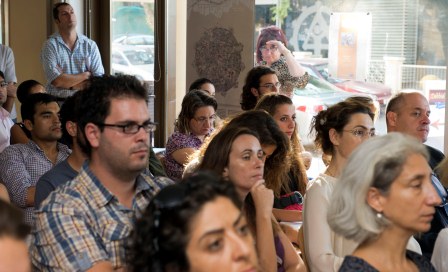Cyprus: Policy brief on empowering women in the peace process

This year marks the 12th anniversary of the United Nations Security Council Resolution 1325 (2000) on Women, Peace and Security adopted on 31 October 2000. The Interpeace initiative in Cyprus, Cyprus 2015, seized the opportunity to advocate for the vital role of women in post-conflict reconstruction processes and to promote greater social inclusion and participation in the peace process.
Women participation: perceptions and realities
Cyprus 2015 has recently conducted surveys on the perceptions of the peace process of both men and women from the Greek Cypriot and Turkish Cypriot communities in terms of values, hopes, fears, and outlook of the peace process.
“Our research suggests that gender discrepancies do exist. For instance, Turkish Cypriot women seem to fear that a settlement of the Cyprus question may lead to economic failure, while Greek Cypriot women are more concerned with renewed conflict and domination by the other side”, explains Erol Kaymak, Research Co-Director of Cyprus 2015. In terms of the outlook of the peace process, the gender difference seems more striking he continues, as “women were found to be at significantly lower knowledge levels than men in both communities regarding the events of the peace process.”
Moving forward: integrating a gender perspective in the peace talks
In order to allow for greater societal input and thus provide new impetus to the peace process, Cyprus 2015 recommends the adoption of a National Action Plan within the framework of the negotiations.
“The establishment of a working group for a gender perspective which would work towards the adoption of a mutually binding framework would entail the broad participation of civil society and relevant stakeholders”, said Ahmet Sözen, Co-Director of Cyprus 2015. Funding would be required from both communities as to ensure mutual trust and commitment, “but it is a first step in working towards greater inclusion of women,” according to Alexandros Lordos, Co-Director of Cyprus 2015.
In and of itself, the development and implementation of a National Action Plan in Cyprus may not transform relations overnight, “but it could serve to galvanize advocates of a new set of norms, reinforcing democratization and participatory processes, both of which could prove to be invaluable assets in guiding Cyprus out of conflict into the realm of sustainable peace and a sustainable future”, added Giorgos Filippou, Senior Researcher of Cyprus 2015.
For more detailed information, the complete policy brief on Gender Participation in the Peace Talks by Cyprus 2015 can be found here (PDF, English).
